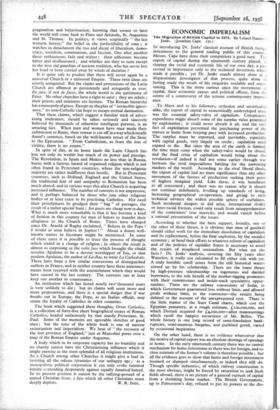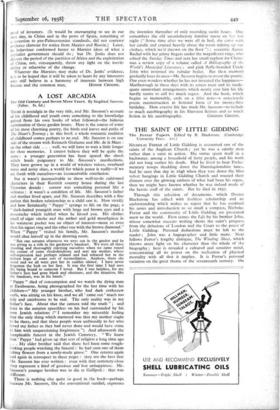ECONOMIC IMPERIALISM
IN introducing Dr. Jenks' classical account of British foreig investment to the general reading public of this counts- .
Messrs. Cape have done their compatriots a good turn. Th export of capital during the nineteenth century played, ir shaping the social and economic life of our own day, a part second in importance only to the technical inventions which made it possible ; yet Dr. Jenks stands almost alone as a dispassionate investigator of that process, quite alone in having made the result of his enquiries readable and enter- taining. This is the more curious since the movements of capital, their economic causes and political effects, form the centre of a controversy of the utmost contemporary import- ance.
To Marx and to his followers, orthodox and unorthodox alike, the export of capital to economically undeveloped areas was the essential safety-valve of capitalism. Conspicuous expenditure might absorb some of the surplus value generated by exploitation ; it could never absorb it all, and the very fact of exploitation prevented the purchasing power of the masses at home from keeping pace with increased production. The surplus must be exported, and inevitably, especially with capital goods, very largely on credit ; capitalism must expand or die. But since the area of the earth is limited, the time must come when the safety-valve would be closed, and the final crisis of capitalism would bring about the revolution—if indeed it had not come earlier through war between the rival imperialisms battling for the narrowing markets of the world. According to the rival liberal thesis, the export of capital had no more significance than any other movement of the factors of production seeking their point of highest marginal yield. Like these, it was beneficent to all concerned ; and there was no reason why it should not continue indefinitely, levelling up standards of living, increasing geographical co-operation, and giving to each technical advance the widest possible sphere of usefulness, Such incidental dangers as did arise, international rivalry or inter-racial friction, could only result from misapprehension of the contestants' true interests, and would vanish before a rational presentation of the issues.
According to whether the facts support, broadly, one or the other of these theses, it is obvious that men of goodwill should either work for the immediate dissolution of capitalism and its replacement, before the final explosion, by the socialist economy ; or bend their efforts to whatever reform of capitalism and of the policies of capitalist States is necessary to avoid the results of misplaced nationalism. But what are the facts ? Dr. Jenks' analysis, covering the fifty years after Waterloo, is really not calculated to fill either side with joy. A truly horrible smell arises from the still historical waters stirred up by his scholarship. There are the loans thrust by high-pressure salesmanship on ingenuous and dazzled borrowers, to the sole benefit of the market-rigging promoters with their commissions and inside-track speculative oppor- tunities. There are the railway concessions of India, in which Government guaranteed loss without limit, and allowed profit without limit, to the contractor—the results being debited to the account of the unrepresented ryot. There is the little matter of the Suez Canal shares, which cost the Egyptian peasantry, at a rough estimate, LI oo,000,000, and which Disraeli acquired for £4,000,000—after manoeuvrings which recall the happier excursions of Mr. Belloc. The whole history is one long record of semi-fraudulent bank- ruptcies, semi-usurious bargains, and purblind greed, varied by occasional inspiration.
On the other hand, there is no evidence whatsoever that the motive of-capital-export was an absolute shortage of openings at home. In the early nineteenth century there was no central mechanism for home investment as there was for foreign, and no close estimate of the former's volume is therefore possible ; but all the evidence goes to show that home and foreign investment boomed or slumped simultaneously, as indeed they still do. Though specific industries; of which railway construction is the most obvious, might be forced by saturation to seek fresh fields abroad, there is no picture of a general outrush of capital from a shrinking home market. The British Government, up to Palmerston's day, refused to put its powers at the dis-, posal of investors. (It would be encouraging to see in our own day, in China and in the ports of Spain, something of a reversion to pre-Palmerstonian standards, did not contrary evidence clamour for notice from Mexico and Russia.) Later, its behaviour conformed better to Marxist ideas of what a capitalist government should do ; but Dr. Jenks does not discuss the period of the partition of Africa and the exploitation of China, nor, consequently, throw any light on the inevit- ability or otherwise of the change.
Whatever the Marxists may make of Dr. Jenks' evidence, it is to be hoped that it will be taken to heart by any innocents who still believe in a harmony of interests between high finance and the common man. HONOR CROOME.











































 Previous page
Previous page